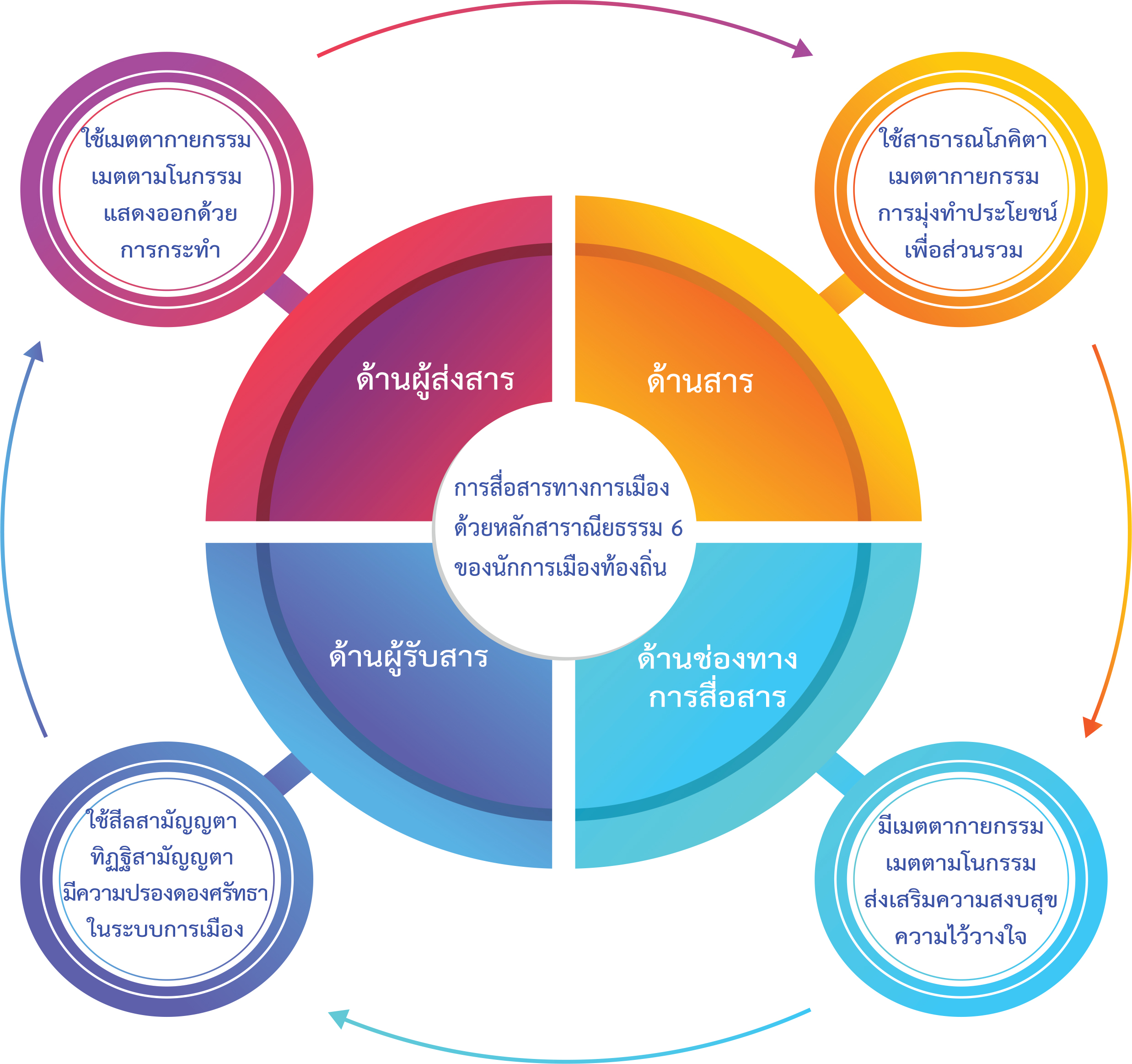Political Communication Based on the Principles of Saraniyadhamma by Local Politicians in Wanorn Niwas District, Sakon Nakhon Province
Keywords:
Political Communication, Sārāṇīya-Dhamma, Local PoliticiansAbstract
The objectives of this research are: 1) to study the political communication of local politicians according to the opinions of the public, 2) to compare the political communication of local politicians by classifying it according to personal factors, and 3) to explore ways to develop political communication by applying the principles of Sārāṇīya-Dhamma (Principles of Right Conduct) to local politicians. This is a mixed-methods research study, with a sample of 399 eligible voters from the Wanorn Niwas District in Sakon Nakhon Province, selected through simple random sampling. Key informants include 9 experts. The research instruments are questionnaires and in-depth interviews. The statistical analysis used includes percentages, means, standard deviations, and descriptive statistics.
The research results found that:
1. The overall political communication of local politicians, according to the public's opinion, is at a moderate level. When broken down by aspect, the highest mean is for the "Sender", followed by three moderate aspects: "Message," "Communication Channels," and "Receiver." The "Planning" aspect is at a low level.
2. The comparison of political communication by personal factors such as gender, age, education, and occupation shows that there are statistically significant differences in opinions regarding political communication at the 0.05 level.
3. Ways to develop political communication by applying the principles of Sārāṇīya-Dhamma to local politicians are as follows: 1) The "Sender" should be knowledgeable in communication, using acts of kindness, positive thinking, and actions that are compassionate and constructive. 2) The "Message" should convey a positive attitude, focusing on public welfare and kindness, working for the benefit of the public without personal gain. 3) The "Communication Channels" should be used by politicians with kindness and positive thinking, promoting peace and trust. 4) The "Receiver" should have a positive attitude, applying the principles of Sīla-Sammā-Ñāṇa (Morality and Right Understanding), leading to clean and just politics, unity, and trust in the political system.
References
พระครูธรรมธรบุญเที่ยง พุทฺธสาวโก (ลักษณ์พลวงค์). (2565). การบูรณาการหลักพุทธธรรมกับการสื่อสารทางการเมืองเพื่อเสริมสร้างความสมานฉันท์. วารสารวิจยวิชาการ, 5(2), 15-25.
พระชินกร สุจิตฺโต (ทองดี). (2564). การบูรณาการหลักพุทธธรรมเพื่อส่งเสริมการสื่อสารทางการเมืองสำหรับประชาชนจังหวัดพระนครศรีอยุธยา. (ดุษฎีนิพนธ์ปรัชญาดุษฎีบัณฑิต). พระนครศรีอยุธยา: มหาวิทยาลัยมหาจุฬาลงกรณราชวิทยาลัย.
พระนุชิต นาคเสโน (โพวิชัย). (2565). การพัฒนาการสื่อสารทางการเมืองตามแนวพระพุทธศาสนาของนักการเมืองท้องถิ่นในจังหวัดพระนครศรีอยุธยา. (ดุษฎีนิพนธ์ปรัชญาดุษฎีบัณฑิต). พระนครศรีอยุธยา: มหาวิทยาลัยมหาจุฬาลงกรณราชวิทยาลัย.
พระมหาณัฏพจน์ ขนฺติธโร. (2565). ปัจจัยที่มีผลต่อการตื่นตัวทางการเมืองของประชาชนในอำเภอละแม จังหวัดชุมพร. วารสาร มจร การพัฒนาสังคม, 7(1), 281-292.
พระมหาพิพัฒพงศ์ ฐิตธมฺโม (วงษ์ชาลี). (2564). การประยุกต์หลักพุทธธรรมเพื่อส่งเสริมการสื่อสารของนักการเมืองไทย. (ดุษฎีนิพนธ์ปรัชญาดุษฎีบัณฑิต). พระนครศรีอยุธยา: มหาวิทยาลัยมหาจุฬาลงกรณราชวิทยาลัย.
พระสังวาน สายเนตร และคณะ. (2565). การสื่อสารทางการเมือง. วารสาร มจร อุบลปริทรรศน์, 7(3), 357-368.
มนัสนันท์ ศิวะพรพัฒนา. (2566). การสื่อสารทางการเมืองของนักการเมืองที่มีผลต่อการไปใช้สิทธิ์เลือกตั้งทั่วไปของประชาชนในอำเภอบ้านบึง จังหวัดชลบุรี. วารสารสหวิทยาการนวัตกรรมปริทรรศน์, 6(1), 74-86.
วัฒนา นนทชิต (2558). การสื่อสารทางการเมืองกับการมีส่วนร่วมทางการเมืองการปกครองท้องถิ่น: ศึกษาเฉพาะกรณีเทศบาลเมืองท่าข้าม อำเภอพุนพิน จังหวัดสุราษฎร์ธานี. วารสารนวัตกรมการจัดการภาครัฐและภาคเอกชน, 3(1), 35-49.
เสรี วงษ์มณฑา. (2537). การประยุกต์ทฤษฎีในการสื่อสารหลักและทฤษฎีการสื่อสาร. กรุงเทพฯ: มหาวิทยาลัยสุโขทัยธรรมาธิราช.
อิสรพงษ์ ไกรสินธุ์. (2560). พุทธวิธีการสื่อสารทางการเมืองในยุคศตวรรษที 21. การประชุมวิชาการระดับชาติ ครั้งที่ 1 การวิจัยทางพระพุทธศาสนาเพื่อพัฒนาความหลากหลายทางวัฒนธรรมในอีสานใต้, 20 มีนาคม 2560. บุรีรัมย์: มหาวิทยาลัยมหาจุฬาลงกรณราชวิทยาลัย.
Yamane, T. (1967). Statistics: An Introductory Analysis. New York: Harper & Row.






